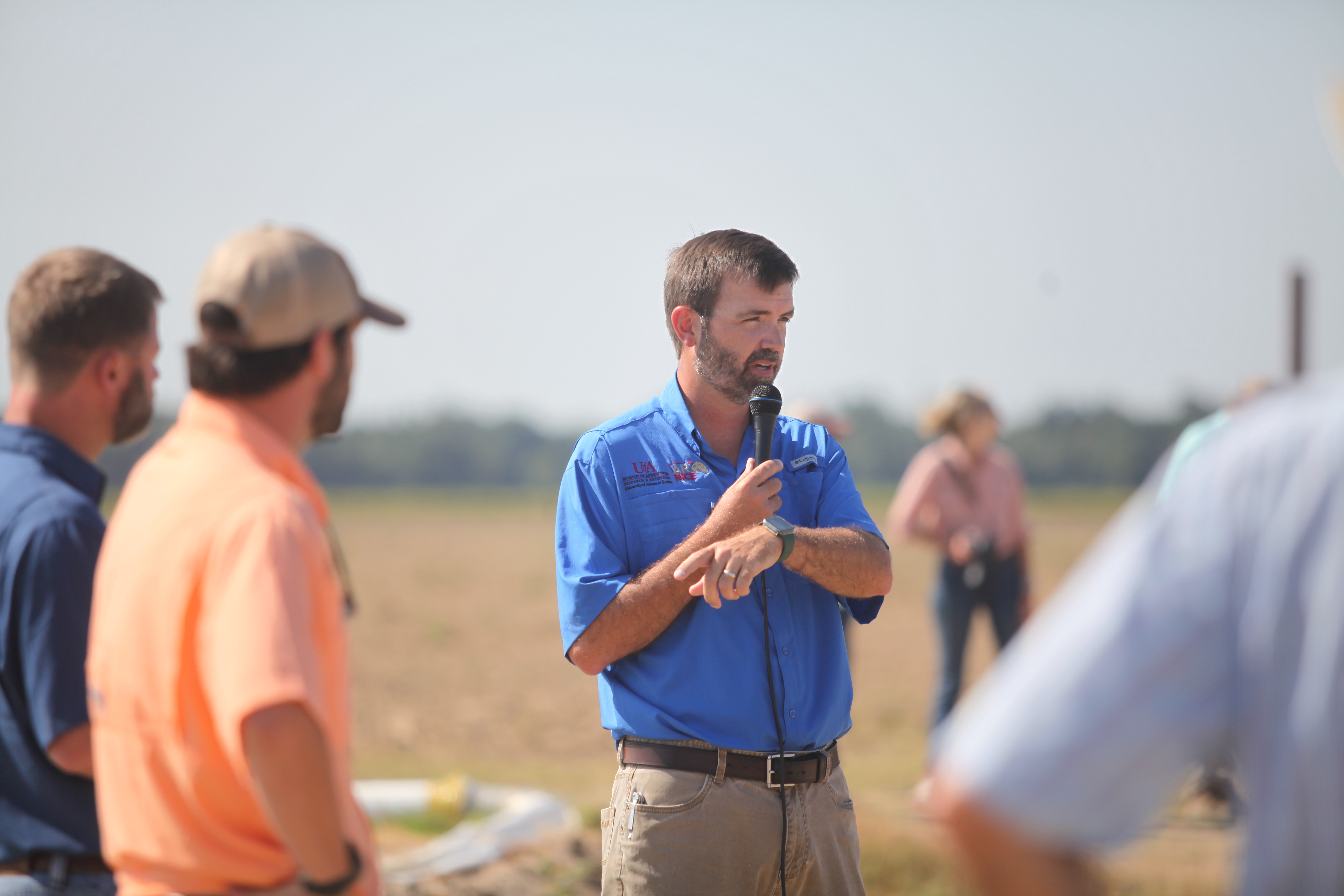Rice Research and Extension Center field day brings ag professionals face-to-face with the reality of 2025
Aug. 18, 2025
By Ryan McGeeney
U of A System Division of Agriculture
Fast Facts:
- High overnight temps likely to affect milling yields
- USDA reduces estimated Arkansas rice acreage
(417 words)
(Newsrooms: Download photos of RREC Field Day)
STUTTGART, Ark. — “As the saying goes: If you don’t have anything nice to say, come stand by me,” said Jarrod Hardke, extension rice agronomist for the University of Arkansas System Division of Agriculture, kicking off his 2025 crop report at the annual Rice Research and Extension Center field day. Shaded from the noonday sun, Hardke spelled out what rice growers in Arkansas are dealing with in 2025 as nighttime temperatures remain stubbornly high.
More than 200 producers, consultants and other agriculture industry professionals attended the annual Rice Research and Extension Center field day on Aug. 7. As hayride tours wound their way around the vast research plots, visiting entomologists, plant pathologists and other crop specialists along the way, attendees experienced the season’s full heat throughout the morning, despite the decision to begin field tours at 7:30 a.m.
Hardke said that the morning’s temperatures were a fair snapshot of the conditions shaping the state’s 2025 rice crop.
“While these 95, 96-degree temperatures aren‘t very enjoyable for us, it’s not awful for the rice,” he said. “The problem we’re focused on is that the nights have stayed as hot as they have. We can’t be definitive in what that impact is going to be, because it hasn’t always been extremely high, but we know it’s not good.”
Generally speaking, Hardke said, when nighttime temperatures don’t drop below 74 degrees Fahrenheit for extended periods, rice grains can adopt a high degree of chalkiness, affecting milling yields.
Low milling yields are not a new frustration for Arkansas rice growers. In 2024, harvests delayed by late summer rains and the remnants of Hurricane Francine pushing into Arkansas in mid-September led to notably low milling yields on an otherwise successful, high-yielding crop.
Like many row crops in the region, the 2025 Arkansas rice crop was essentially broken into two phases — fields planted before the rain and flooding events of early April, and the fields planted (or replanted) after. Even throughout May, however, periodic rains kept many growers from planting. In June, the U.S. Department of Agriculture reduced Arkansas’ estimated 2025 rice acreage from more than 1.4 million acres down to 1.26 million acres.
Hardke said that between the “spread out” nature of this year’s planting, and the unevenness of rainfall across the state, the yield and milling potential of any given field is unknowable at this point.
“You’ll never get me to walk into a rice field and tell you what it’s going to yield,” he said. “We’re not going to chase that.”
To learn about extension programs in Arkansas, contact your local Cooperative Extension Service agent or visit www.uaex.uada.edu. Follow us on X and Instagram at @AR_Extension. To learn more about Division of Agriculture research, visit the Arkansas Agricultural Experiment Station website: https://aaes.uada.edu/. Follow on X at @ArkAgResearch. To learn more about the Division of Agriculture, visit https://uada.edu/. Follow us on X at @AgInArk.
About the Division of Agriculture
The University of Arkansas System Division of Agriculture’s mission is to strengthen agriculture, communities, and families by connecting trusted research to the adoption of best practices. Through the Agricultural Experiment Station and the Cooperative Extension Service, the Division of Agriculture conducts research and extension work within the nation’s historic land grant education system.
The Division of Agriculture is one of 20 entities within the University of Arkansas System. It has offices in all 75 counties in Arkansas and faculty on three campuses.
Pursuant to 7 CFR § 15.3, the University of Arkansas System Division of Agriculture offers all its Extension and Research programs and services (including employment) without regard to race, color, sex, national origin, religion, age, disability, marital or veteran status, genetic information, sexual preference, pregnancy or any other legally protected status, and is an equal opportunity institution.
# # #
Media Contact:
Ryan McGeeney
rmcgeeney@uada.edu
501-671-2120
